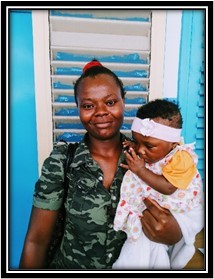Kangaroo Mother Care Impact Bond supports neonatal nutrition in Cameroon
A blog written by: Hortance Manjo (KMC DIB Programme Manager) and Marie-Alphie Dallest (Social Finance) The Kangaroo Mother Care Development Impact Bond (DIB) aims to reduce neonatal mortality and morbidity by scaling up Kangaroo Mother Care (KMC) practice in public hospitals across Cameroon. At…
A blog written by: Hortance Manjo (KMC DIB Programme Manager) and Marie-Alphie Dallest (Social Finance)
The Kangaroo Mother Care Development Impact Bond (DIB) aims to reduce neonatal mortality and morbidity by scaling up Kangaroo Mother Care (KMC) practice in public hospitals across Cameroon. At present, for every 1,000 births in Cameroon, around 27 newborns die. Despite significant improvements over the last 50 years, this is still well above the OECD average of 3.8 deaths per 1,000 live births. .
Kangaroo Mother Care is an evidence-based approach that supports physical, mental and emotional development for preterm and low-birth weight infants. Initially developed in Colombia, it is based on 3 key pillars: extended skin-to-skin contact between the carer and the child; exclusive breastfeeding; and regular follow-up after hospital discharge. KMC is particularly well suited to low resource settings as it does not require expensive equipment or reliable electricity. A meta-review conducted in 2016, concluded that KMC reduces neonatal mortality, morbidity and hypothermia. It also improves infant growth, breastfeeding and mother-infant attachment.
Despite this compelling evidence base, KMC has not been scaled widely to date and the approach is not generally incorporated into mainstream medical training. Adaptation may be needed to overcome locally-specific cultural barriers to skin-to-skin care, and clinician preferences for higher-tech interventions. To overcome such challenges, the Cameroon KMC DIB harnessed upfront funding from an impact investor (Grand Challenges Canada) to pay for a Cameroon-based NGO (Fondation Kangourou Cameroun) to use adaptive management approaches to delivering training, equipment and support to public hospitals and their clinicians. Delivery costs are reimbursed by the Cameroon Ministry of Public Health and Nutrition International based on independently evaluated outcomes around intervention quality and infant nutrition.
 “Kangaroo Mother Care has changed my experience of motherhood by creating a very strong bond of love with my babies. I have learned how to take good care of my babies through massage, feeding and stimulating suction.”
“Kangaroo Mother Care has changed my experience of motherhood by creating a very strong bond of love with my babies. I have learned how to take good care of my babies through massage, feeding and stimulating suction.”
Fallone Dongmo, Laquintine Hospital, Douala (March 2020).
The DIB is currently funding KMC delivery in 10 hospitals across 5 regions of Cameroon. Since the program started in February 2019, more than 1,200 infants and their families have benefited from this practice. Exclusive breastfeeding is a central pillar of KMC not only for its nutritional benefits, but also for the connection that it builds between a mother and child. Mothers enrolled in the KMC program are taught how to express milk, help their infants to latch correctly and implement a responsive feeding routine. When infants are too young to have a reliable sucking reflex, they are fed breastmilk through tubes, cups or syringes. Hospital staff also ensure that care givers can massage babies and know how to carry babies in kangaroo position

As of today, 84% of mothers practicing KMC in the program exclusively breastfeed (EBF) their infants. 86% of babies show appropriate weight gain by 40 weeks gestational age. Mothers understand the benefits of breastfeeding and appreciate its affordability. EBF levels are lowest in the two public-private hospitals in the program which cater to more affluent patients. As a recent study showed that artificial milk use is positively correlated to wealth, more work is needed to overcome the perception that breastfeeding is a solution for lower income households.
The Cameroon KMC DIB monitors nutrition outcomes at two points in its payment structure. Payments are made only if infants are deemed to have practiced quality KMC, including appropriate nutrition, while in hospital. Nutrition is also assessed after discharge with payments linked to appropriate nutrition at home and adequate post-discharge weight gain.
The Government of Cameroon is now keen to see KMC rolled-out to other regions of the country once the DIB comes to an end next year. Partners are currently developing a strategy to enable this. For more information on the Cameroon KMC program, Development Impact Bonds or outcomes-based approaches to nutrition programs contact: Marie-Alphie.Dallest@socialfinance.org.uk

